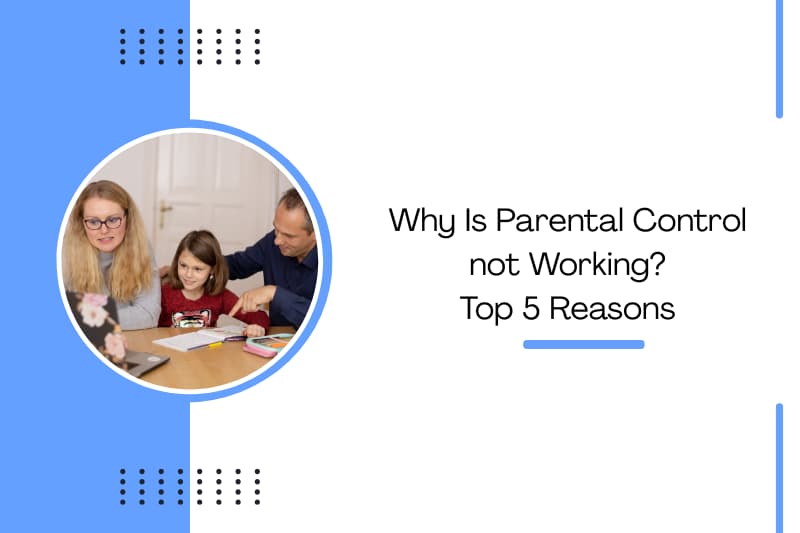Why Is Parental Control not Working? Top 5 Reasons
2025-06-27

From a psychological viewpoint, parental control requires a deliberate approach to its implementation. It’s common for parental controls to fail. Why, you may ask?! In this article, we will explore 5 top reasons why it may not be working in your family.
Problem #1: The Illusion of Control
From a psychological viewpoint, one of the biggest misconceptions about parental control is that it gives parents full authority over their child's digital behavior. It feels safe, reassuring-even powerful. But here's the catch: that sense of control is often just an illusion.
Many parents believe that installing an app or setting time limits is enough to manage what their child sees or does online. In reality, kids-especially tech-savvy ones-can quickly find ways around restrictions. And when they do, the parent ends up feeling blindsided, frustrated, and, most of all, powerless.
Why does this happen? Because parental control tools can't replace real communication or awareness. If the focus is only on blocking or limiting, rather than understanding and guiding, the control becomes surface-level. It looks effective until it's not.
So, while tools and settings are helpful, they must be part of a larger strategy-one that involves trust, education, and active involvement. Without that, control becomes a digital illusion-and illusions always fade.
Problem #2: Psychological Reactance in Kids
From a psychological viewpoint, one key reason parental control doesn't always work is something called psychological reactance. It's a natural human response-and yes, kids have it in abundance.
Reactance happens when a person feels that their freedom is being threatened or taken away. And guess what? When you put strict digital rules in place without context or collaboration, kids often don't see it as protection, they see it as control. The immediate response is to push back. They do it because they feel the need to reclaim autonomy.
Let's take an example. You set a screen time limit on a gaming app. Your kid knows when the time is over, and instead of accepting it, they look for loopholes. They may either change the device clock, use a different account, or sneak another device altogether. What's happening here isn't just a tech workaround. It's a psychological response to what they perceive as an unfair restriction.
This doesn't mean you should never set boundaries. It means how to set them eco-friendly. If a child understands the "why" behind a rule and has some say in how it's applied, they're far more likely to accept it. When they feel heard and respected, the urge to rebel weakens.
Problem #3: Trust vs. Surveillance
Obviously, there is a fine line between trust and surveillance. When this line is crossed, it can quietly erode the very relationship you’re trying to protect.
Many parental control tools are released with features like GPS tracking, message monitoring, app usage logs, and even screen capturing. On the surface, these seem helpful, who wouldn’t want to know their child’s location or who they’re texting? But when children understand the essence of parental control, they may start to hide rather than share.
It doesn’t happen overnight. Kids cannot ignore these little steps when their parents know more than they said. Surveillance, even when well-intentioned, can send a message that says: “I don’t trust you to make good choices.”
Only thoughtful steps guarantee the eco-friendly implementation of parental control in the family. Kids should have a firm ground through understanding they are trusted and protected.
Problem #4: Over-Focus on Tech, Under-Focus on Habits
Parental control requires more than just setting up the latest app with filters on your kid's gadget. It demands consistency, communication, and most importantly-habit formation. Yet, many parents fall into the trap of over-relying on technology while underestimating the power of daily routines and healthy behaviors. In this article, we uncover why focusing too much on tech and not enough on habits is one of the top reasons parental controls fail-and how you can fix it.
Right digital habits that can be developed with parental control software:
- Balanced screen time management
- Responsible online behavior
- Healthy sleep hygiene
- Focus during homework or study time
- Content filtering and safe browsing
- Digital breaks and eye health awareness
- Tech-free family time
- Goal-oriented gaming
- Privacy and personal information protection
If parents choose the right focus, there won't be any obstacles for parental control success.
Problem #5: Communication Gaps
One more problem worth mentioning is a communication gap. Sometimes parents rely on modern parental control software too much, forgetting to communicate with a child.
While technology may help enforce boundaries, it cannot teach values, build trust, or foster emotional connection. That’s where open and transparent dialogue comes in. Talking with your child about why rules exist, what healthy digital habits look like, and how to make safe, responsible choices online is essential for long-term success.
What Actually Works: Psychological Strategies
While parental control software helps parents set digital boundaries, it cannot guarantee 100% effectiveness. So, psychologists develop a set of rules that are used to make parental control even more efficient.
- Use collaborative goal setting (not just rules)
- Foster intrinsic motivation over external control
- Apply positive reinforcement, not just punishment
- Build emotional safety to encourage honesty
- Practice reflective listening and empathy
- Model the behavior you want to see
By combining empathy with structure, communication with consistency, and habit-building with technology, you'll be giving your child the tools they need to thrive - both online and offline.
Final Thoughts
Parental control may not work all alone, if it is not supported by many psychological aspects. The above insights guarantee that the collaboration of open discussion and modern technologies will give the results every parent desires. Your kids will be secured both - online and offline.
